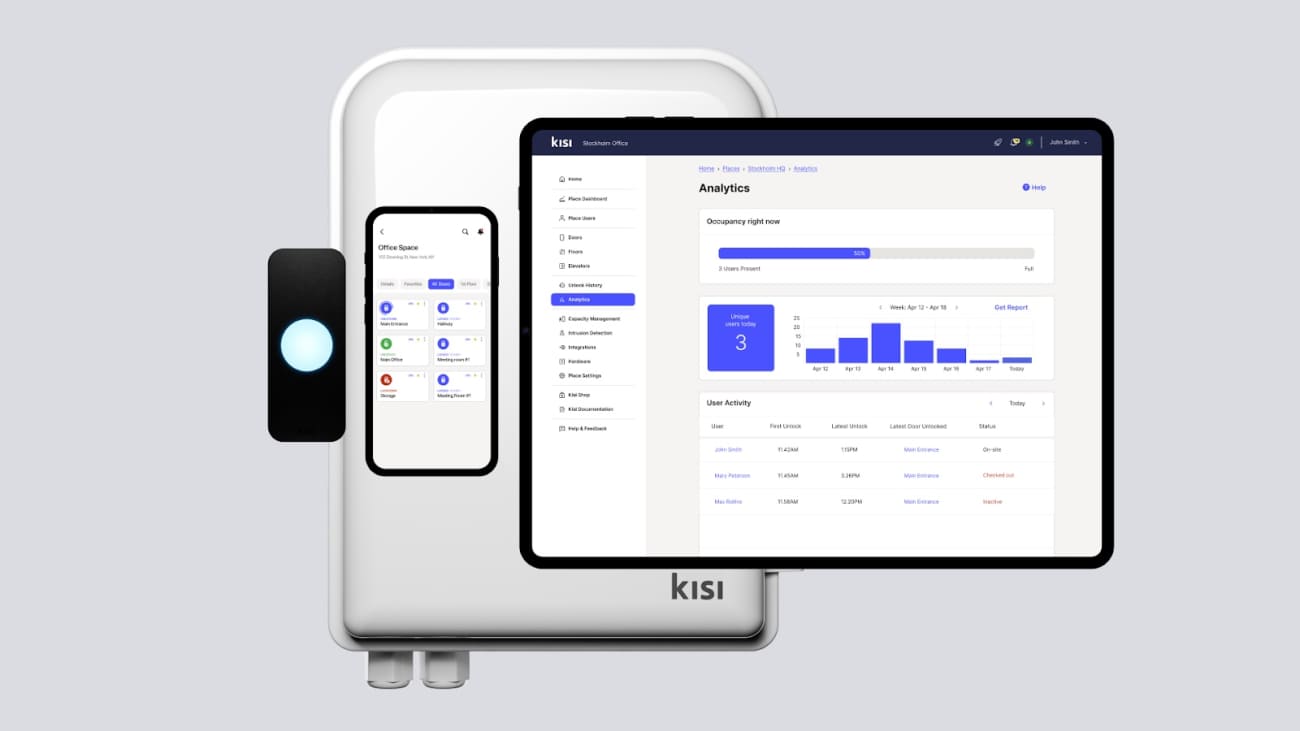What is flexible space or “flex space”? #
Flexible space or “flex space” is commercial real estate that offers a multi-purpose space to meet different functions. Flex space typically combines retail and office spaces and is grouped by shared common areas such as reception, lounges, conference rooms, kitchens, restrooms, and hallways.
Today, the demand for flex spaces in commercial real estate is rising because of changing work patterns and the need for more versatile spaces.
Traditional working patterns and office designs are giving way to more dynamic and employee-centric work cultures. Flex spaces align with this shift by providing a more agile environment that caters to different work styles and preferences.
Developing flex spaces offers benefits such as increased property value, improved tenant attraction and retention, enhanced space utilization, and a competitive advantage in the real estate market. These advantages make flex spaces an attractive investment option for coworking space managers, property managers, and developers.
Flex space vs. Coworking space #
Flex and coworking spaces have different purposes and target audiences, but the best practice for managing both spaces is very similar.
Flex working spaces are about providing flexible and adaptable work environments for individuals and businesses. On the other hand, coworking spaces emphasize community and collaboration in typically open-plan environments.
Both types of spaces should adhere to best practice principles such as flexibility, amenities, community building, privacy options, and maintaining a professional environment. These principles ensure that the spaces meet the needs of tenants and create a productive and engaging work environment.
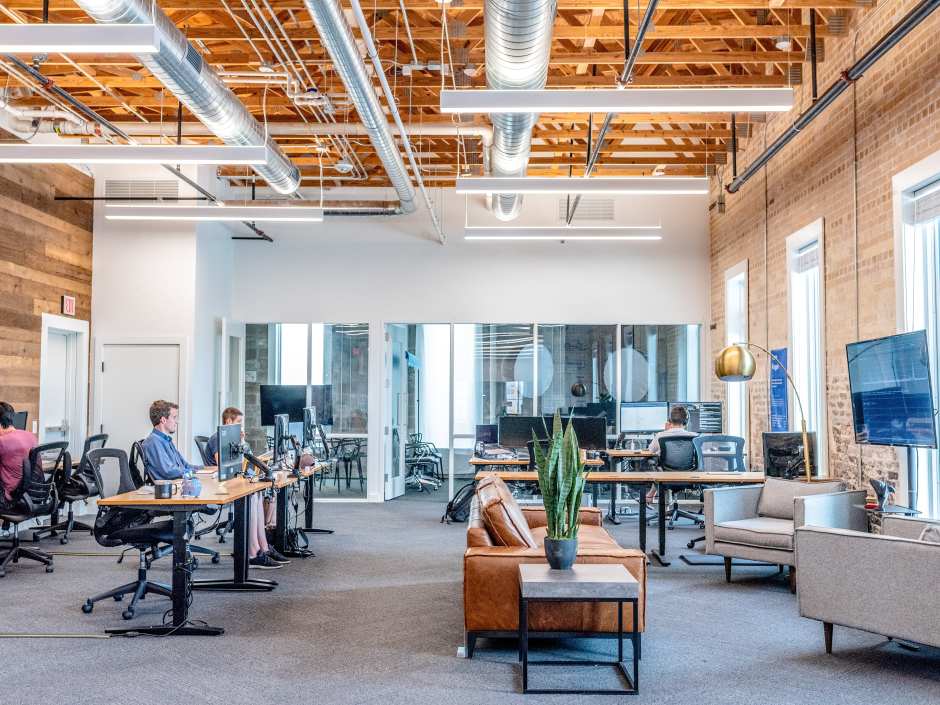
The biggest challenges of managing flex spaces #
Managing a flex space presents unique challenges due to the dynamic nature of the environment and the diverse group of users. Some of the main challenges include:
- Ensuring security - Robust systems like access control and surveillance cameras are essential for shared office security.
- Access management - Managing access for a rotating roster of users requires an efficient system to grant and revoke access rights. This may involve using electronic keycards, mobile apps, or access codes that can be easily managed and monitored.
- Maintaining privacy - Providing dedicated private offices, soundproof meeting rooms, and designated quiet areas can address the diverse needs of users. Implementing technologies like sound masking and privacy screens enhances data protection.
- Space utilization and monetization - Booking systems ensure users can access desired meeting rooms or workstations. Tiered memberships with on-demand bookable spaces is a route to increased revenue from your space.
- Maintenance - With a high turnover of users, maintaining cleanliness and ensuring regular maintenance becomes crucial. Regular cleaning schedules, proper waste management, and prompt repairs are essential to provide a comfortable and professional environment.
Enhancing user experience with access control #
Access control systems provide a proven solution to the unique challenges of managing and securing shared spaces, such as flex spaces or coworking environments. These systems not only help you regulate access but also help improve the user experience for clients and employees alike and boost your revenue.
An efficient access control system enhances the member user experience in commercial real estate spaces, impacting client attraction and retention. It achieves this by enabling a seamless entry experience and convenience for tenants. By using modern authentication methods like mobile apps or keycards, tenants can easily access the premises, leaving them with a positive impression.

On top of this, access control systems help improve the user experience for property and coworking space managers. The systems generate valuable data and insights on user traffic, enabling managers to optimize space utilization and operational efficiency. Access control allows staff to manage different locations and users remotely. It also removes the hassle of managing keys, so they don’t need to worry about running after tenants to hand over keys and outdated cards.
Furthermore, access control systems allow you to monetize access and increase profit. By integrating with your space management software, you can monetize all rooms and amenities by turning them into 24/7 bookable spaces. Or you can use access control to roll out tiered memberships and automate granting specific access permissions for different membership levels. The data and insights garnered from access control will allow you to tailor new offerings to users. Advanced access control systems can also set a commercial real estate space apart from competitors, attracting businesses seeking innovation and cutting-edge solutions.
Bringing all your systems together with access control #
Integrating systems is a critical step in maximizing the efficiency of flex spaces. Access control provides a centralized platform to connect with other systems commonly used in flex spaces, such as surveillance cameras, visitor management systems, and space management software.
Integration with surveillance cameras allows for a synchronized view of access events with video footage, providing additional security and monitoring capabilities. Integrating visitor management systems simplifies the check-in process for guests, ensuring a smooth and professional experience. Integrating access control with your flex management software lets you turn all your areas into on-demand bookable spaces.
By integrating systems with access control, flex space owners and managers can create a cohesive and efficient ecosystem that enhances building security, improves user experience, and maximizes the potential of their spaces.
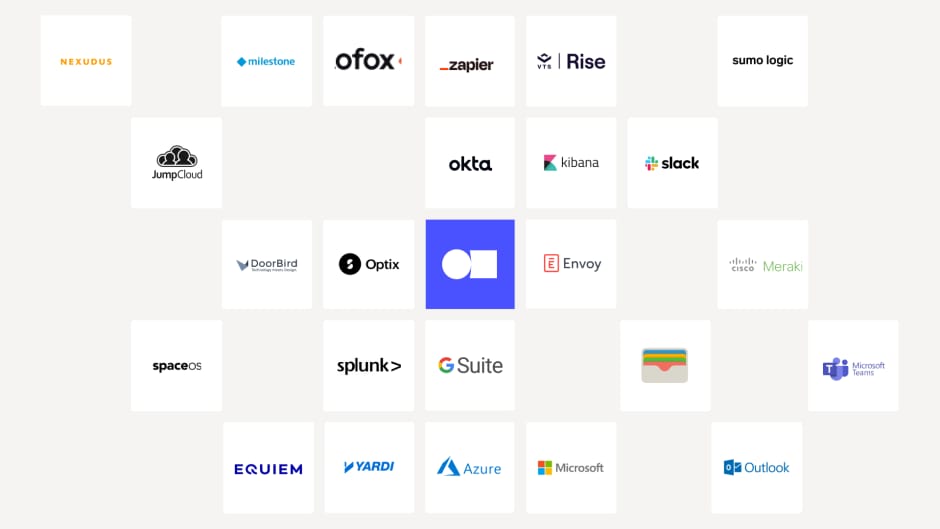
Flex space software that integrates with Kisi access control #
- OfficeRnD: OfficeRnD’s integration with Kisi lets you completely automate door access control in your flexible workspace. Onboard new members by automatically issuing keys when they sign up for a membership. Disable access keys automatically when a membership is canceled without the need to return physical keys. Perform emergency unlocks for your space remotely from anywhere in the world. Get notifications when a member accesses your space after normal business hours.
- Yardi Kube: This integration with Kisi enables touchless access control in your flexible spaces. Automatically issue access permission to new members in the signup workflow and disable access when a membership ends. Emergency unlocks can be performed remotely, and you’ll be notified when members enter and leave your space, including after hours.
- Optix: Integrate Kisi door access with the Optix platform and automatically share access to your flex space via the Optix app. Enable custom access via Kisi based on plan subscriptions, bookings, check-ins and assignments in Optix. Grant access for custom time periods according to the user’s needs. Automatically grant or revoke access when you change a user's subscription in Optix with updates in real-time. Track door entry and exit statistics to better understand who uses your space and when. Create a cohesive brand experience with a white-labeled app with integrated access controls.
- Nexudus: The Nexudus integration with Kisi allows you to instantly grant access to the appropriate areas of your flex space based on their membership tier or price plan, eliminating the need to make and track access cards and physical keys. When members check into a facility using Nexudus, the Kisi app will automatically control which areas they have access to, allowing managers greater control over the physical space. Enabling the Kisi and Nexudus integration paves the way to more streamlined member management while prioritizing the security and safety of your flex space.
- Spacebring: By connecting your Spacebring account with Kisi, you will be able to seamlessly manage access permissions based on your membership tiers. This integration can bring exciting new revenue opportunities to your business, like charging for access to different areas within your space or offering 24/7 access to members.
- Archie: Connect your Archie account to Kisi to easily grant new members and external clients access to your space or specific rooms automatically. The integration will allow you grant accesses manually or based on triggers like plan purchases, room or desk bookings and much more to bring a keyless experience to your flex spaces.
Implementing access control in your flex space #
Choosing and implementing an access control system for a flex space requires careful consideration of several key factors. Here's a step-by-step guide to help you navigate the process effectively.
1. Assess your needs and objectives #
Determine your specific requirements, such as the number of users, areas that require access control, and desired features. Identify your goals, such as enhancing security, improving operational efficiency, or providing a seamless user experience.
2. Determine cost considerations #
Define your budget for the access control system, including upfront costs, installation expenses, and ongoing maintenance and support fees. Compare the costs of different systems, considering factors like hardware, software licenses, integration capabilities, and potential infrastructure changes.
3. Research solutions #
Conduct thorough research on access control system providers, considering their reputation, experience, and customer reviews. Evaluate the features and functionalities of different systems, such as authentication methods, mobile access, integration options, and reporting capabilities.
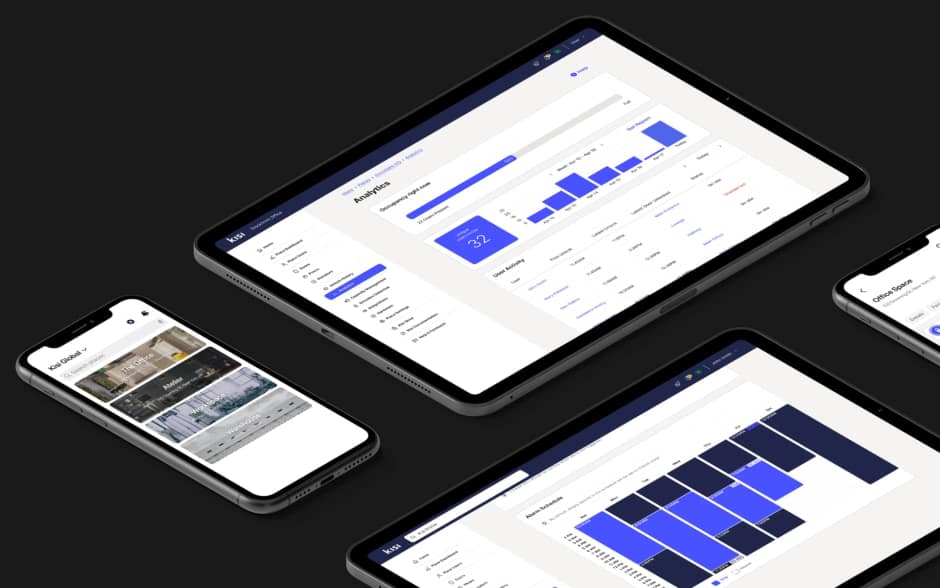
4. Request demos, quotes, and proposals #
Reach out to multiple access control system providers and request demos, quotes detailed proposals that align with your specific needs and objectives. Consider user and admin experience. Obtain quotes that include hardware costs, software licenses, installation, training, and ongoing support.
5. Conduct site surveys #
Collaborate with the chosen access control system provider to conduct site surveys and assess your infrastructure's readiness for installation. Identify any necessary infrastructure changes, such as wiring, power supply, or network upgrades, and consider their associated costs and timelines.
6. Evaluate integration capabilities #
Determine if the access control system can integrate with your existing infrastructure, such as CCTV cameras, alarm systems, or building management systems.
Assess the compatibility and ease of integration with other software or platforms you use, such as membership management systems or scheduling software.
7. Plan for implementation and deployment #
Create a detailed implementation plan, including timelines, resource allocation, and coordination with relevant stakeholders. Communicate the implementation plan to staff, tenants, and other stakeholders, providing clear instructions and addressing any concerns or questions.
8. Training and onboarding #
Ensure that staff members responsible for managing the access control system receive comprehensive training on its operation, administration, and troubleshooting.
Develop onboarding processes for new users, including instructions on accessing the space, downloading necessary apps, and understanding the access control protocols.
9. Test and fine-tune the system #
Conduct thorough testing of the access control system to ensure its proper functioning and alignment with your desired settings and access permissions.
Make necessary adjustments and fine-tune the system based on user feedback and any identified issues or improvement opportunities.
10. Ongoing maintenance and support #
Establish a maintenance and support plan with the access control system provider, ensuring prompt assistance in case of any technical issues or system updates.
Regularly review and update access permissions, revoke access for former users, and adapt the system as your flex space evolves.
Introducing Kisi, a complete solution for flex space management #
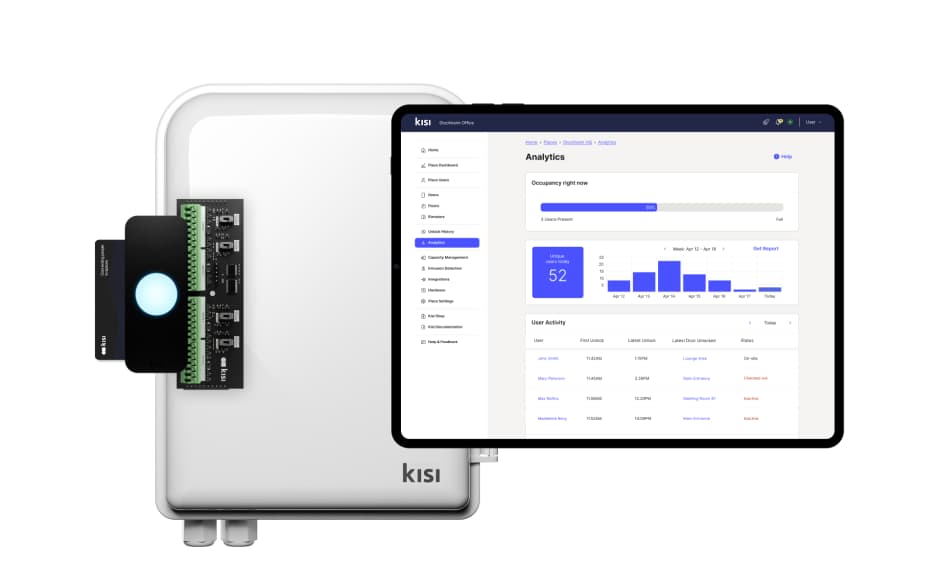
Kisi is a leading access control system that offers advanced features specifically designed to address the challenges of flex spaces. Its capabilities, such as remote access control, real-time monitoring, and integration options, enhance both the safety and user experience within flex spaces.
- Remote access control: This allows flex space managers to grant or revoke access to users from anywhere using a web-based dashboard or mobile app.
- Real-time monitoring: Kisi provides real-time monitoring of access events, allowing managers to keep a close eye on who enters the space and when. This feature offers valuable insights and improves security by enabling immediate identification of any unauthorized access attempts or suspicious activities.
- Monetization: Allow 24/7 access and reduce front-desk staffing requirements with our keyless, mobile-based access control solution.
- Integration capabilities: Kisi offers a range of integrations with other systems commonly used in flex spaces, further enhancing security and user experience. For example, integrating with surveillance cameras enables a synchronized view of access events with video footage. Integration with visitor management systems streamlines the check-in process for guests. Kisi integrates with specialist coworking software like Yardi Kube, Archie, and Optix to sync space management and operations.
- Mobile access: Kisi supports mobile access, allowing users to use their smartphones as virtual keys. Mobile access also offers greater flexibility and eliminates the risk of lost or misplaced physical credentials.
- User-friendly interface: Kisi provides an intuitive and user-friendly interface for administrators and users. Administrators can easily manage access permissions, view activity logs, and adjust the system settings through the web-based dashboard. Users can enjoy a seamless experience with smooth access to the flex space using their smartphones or assigned access cards.
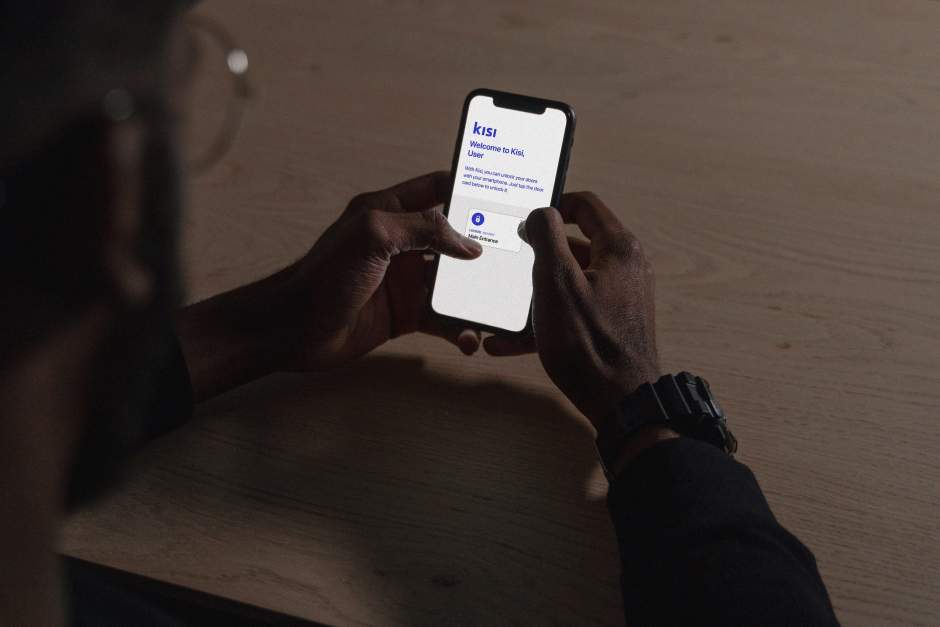
McDougal Coworking's success story #
Kisi has helped numerous flex and coworking spaces optimize operations, improve member experiences, and drive financial gains through access control.
McDougal Coworking, a real estate business based in Texas, successfully transformed its old corporate real estate headquarters into a thriving coworking space with the help of Kisi's smart access control solution. After realizing the potential of coworking, they decided to create a local branded coworking space to cater to their market. Before opening its doors, they installed Kisi to manage access control and operational efficiency.
By integrating Kisi with their membership software, Cobot, McDougal Coworking was able to provide a seamless experience for their members. Members automatically received invitations to download the Kisi app and were given preset permissions, eliminating the need for staff intervention. Additionally, Kisi's scheduling system enabled the rental of meeting spaces after hours, providing new monetization opportunities for McDougal Coworking.
Implementing Kisi not only enhanced the operational efficiency of McDougal Coworking, but also resulted in significant cost savings. The reduced reliance on staff hours saved the company ten times the monthly cost of the system. Furthermore, individual spaces within the coworking space, such as private offices, were leased at higher rates compared to other office spaces in the market. McDougal Coworking attributed a 25% premium to their space, factoring in common areas and overhead costs.
Conclusion #
Access control systems play a pivotal role in the successful management and growth of flex spaces. These systems regulate access, ensure security, and maintain privacy within the space, thereby enhancing its functionality, security, and appeal.
Investing in access control systems is crucial for flex space owners looking to create productive work environments. An efficient access control system enhances the user experience and contributes to client retention and attraction in this competitive market. Moreover, access control systems offer centralized access management, generating valuable data and insights that enable property managers to optimize space utilization and tailor offerings to customers.
Kisi, a leading access control system, offers advanced features specifically designed for flex space management. Learn more about the benefits of Kisi access control or request a demo.

Rebekah May
Rebekah May is on a mission to increase awareness about the benefits of physical access control, and create safer spaces around the world.



